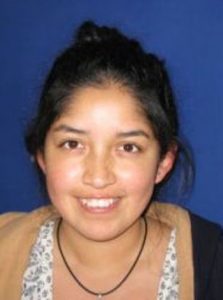Forbes quoted Justin Ritchie and Hadi Dowlatabadi from UBC’s Institute for Resources, Environment and Sustainability at UBC, about the RCP8.5 pathway.
We may avoid the very worst climate scenario. But the next-worst is still pretty awful.
Hadi Dowlatabadi, a professor at the Institute for Resources, Environment and Sustainability at UBC, says the levels of coal use in the high-end warming scenario were always implausible given the world’s coal reserves.
Ottawa closer to single-use plastic ban after finishing science assessment
UBC environmental lawyer David Boyd says Canada needs to take action to match the rhetoric about the single-use plastic ban.
March 5, 2020: IRES Professional Development Seminar with Tom Hetherington
IRES Seminar Series
Time: 12:30pm to 1:30pm (every Thursday)
Location: AERL Theatre (room 120), 2202 Main Mall
*********************************************************************************
From climate grief to action
People from all walks to life are struggling to cope with the emotional impact of the climate crisis. In this Professional Development Seminar, Tom will share strategies and supports from the “From Climate Grief to Acton (FCGA)” group for dealing with feelings associated with eco-grief and/or climate anxiety, including non-judgmental personal storytelling, building communities of mutual support, mindfulness exercises, and self-empowering action planning.
Tom Hetherington
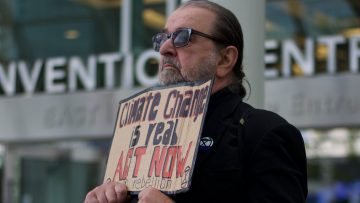
Bio:
Tom Hetherington, MSW, is a recently retired Social Worker who has supervised professional teams of counsellors and students for many years. Tom is the leader of a team of other professionals, practitioners, and students who have developed the From Climate Grief to Acton (FCGA) group to create a space for people to express their thoughts and grief about the climate emergency without judgment.
February 27, 2020: IRES Faculty Seminar with Jiaying Zhao
IRES Seminar Series
Time: 12:30pm to 1:30pm (every Thursday)
Location: AERL Theatre (room 120), 2202 Main Mall
*********************************************************************************
The impact of direct giving on people experiencing homelessness: Experimental evidence from Vancouver, Canada
A growing body of research suggests that direct cash transfers are an effective solution to reduce global poverty, although most evidence comes from developing countries. The current study is the first randomized control trial in developed countries examining the impact of unconditional cash transfers on homeless individuals. Specifically, we distributed a one-time unconditional cash grant of $7,500 to each of 50 homeless individuals in Vancouver, with another group as controls. Our preliminary data show that the cash transfer results in significant improvements in housing stability, food security, savings, and cognitive function, with no increases in spending on temptation goods. Based on a cost-benefit analysis, the cash transfer results in net savings per person per month via reduced shelter use. Our preliminary findings suggest that unconditional cash transfers can be an effective and cost-effective solution to reduce homelessness in developed countries.
Jiaying Zhao
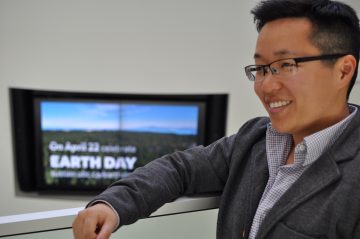
Bio:
Jiaying Zhao is the Canada Research Chair in Behavioural Sustainability, and an Associate Professor in the Department of Psychology and the Institute for Resources, Environment and Sustainability at UBC. Her research uses psychological principles to design behavioural solutions to address financial and environmental sustainability challenges.
Website: https://zhaolab.psych.ubc.ca/
IRES Profile: https://ires.ubc.ca/person/jiaying-zhao/
Google Scholar: https://scholar.google.ca/citations?user=w6d1YTgAAAAJ&hl=en
February 20, 2020: No Seminar Due to Reading Week
There will be no seminar on Thursday, February 20 due to Reading Break (Feb 18-21).

February 13, 2020: IRES Student Seminar with Juan Diego Martinez and Andrea Byfuglien
IRES Seminar Series
Time: 12:30pm to 1:30pm (every Thursday)
Location: AERL Theatre (room 120), 2202 Main Mall
*********************************************************************************
*** CLICK HERE TO VIEW RECORDING (Andrea 04:30-32:28) (Juan Diego 34:22-54:47)***
Reducing inequality in food access as a means to achieving the UN Sustainable Development Goals
The synergies between the whole set of SDGs highlights the relevance and central role the food system plays in achieving a better future for humanity and staying within planetary boundaries. Two main determinants of food access at the individual level are national food availability and household income. For this reason, the reduction of inequality among and within countries (SDG 10) will better enable achieving some of the most morally profound SDGs, ending poverty and eradicating hunger (SDGs 1 and 2). In this study we provide insights into within-country inequality in food access to enable future income-based estimation of environmental impacts across the globe. We used national income distribution by decile and national food availability estimates by major food group to estimate how food and nutrient access varied by income within countries over the past half century. We then used a scenario-based approach to study different future interactions of income growth, inequality trends and food productivity to estimate future food security and nutrition indicators. Our results show that future inequality plays a key role in pathways toward ending hunger and poverty.
Juan Diego Martinez
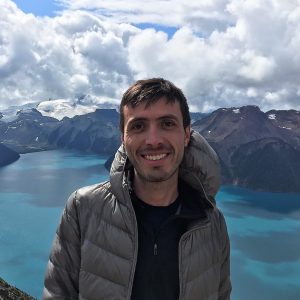
IRES PhD Program
Bio:
Juan Diego is a PhD student at IRES working with Dr. Navin Ramankutty. His research is centered at the intersection between Food and Nutrition Security and the environmental impacts of different diets. Currently understanding how access to food is shaped by income/expenditure inequality, illustrating the disparities among and within countries in the past decades.
He holds a B.Sc in Biology and a B.Eng in Industrial Engineering for the Universidad de los Andes, Colombia. In the past, he worked with the Alexander von Humboldt Biological Research Institute and as a renewable energy consultant for Latin America
The roles of affect and sustainability education in increasing pro-environmental actions in a botanical garden
Human impacts on the environment are evident. Behaviour change lies at the root of solving environmental issues and realizing the Sustainable Development Goals. A key question is how to promote pro-environmental behaviour. We conducted an experiment in UBC Botanical Garden to determine how affect and a sustainability education program influence pro-environmental behavior. To our surprise, we find no significant effect of affect or education on behaviour. Our findings contrast with previous research showing the benefit of heightened affective responses or education. This study highlights the complicated relationship between human emotions, knowledge, and pro-environmental behaviour. It calls for further research to better understand how the feeling system and the learning system relate to pro-environmental behaviour.
Andrea Byfuglien
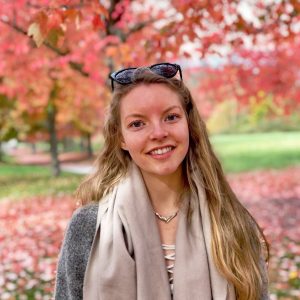
IRES MSc Program
Bio:
Andrea joined IRES in 2018 as a Master of Science student under the supervision of Dr. Jiaying Zhao. She holds a Bachelor of Arts in Psychology and Geography from The University of Melbourne. Her research at IRES is in collaboration with UBC Botanical Garden, and examines how education and emotions can be leveraged to foster pro-environmental behaviour. Andrea is interested in advancing sustainable development through applied behavioural science. As an advocate for climate justice, she is determined to amplify meaningful engagement with the public and empower others in addressing the climate crisis.
February 6, 2020: IRES Faculty Seminar with Mark Harris
IRES Seminar Series
Time: 12:30pm to 1:30pm (every Thursday)
Location: AERL Theatre (room 120), 2202 Main Mall
*********************************************************************************
*** VIEW SEMINAR RECORDING (Audio begins at 4:55min)***
Dancing for Country (towards Reconciliation?) – A non-Indigenous Australian perspective
On December 1, 2019, for the first time in history, Indigenous communities from across Australia danced in unison at the same time, dancing for Country, for ancestors and for healing. For the first time in over 150 years, Corroboree took place on Gundungurra Country (in south-eastern New South Wales). In this presentation I want to juxtapose this moment with the recent history of moves to achieve Reconciliation in Australia that began with the establishment of a Council for Aboriginal Reconciliation in 1991 and was followed by the attempts to comprehend Australia’s history of forced removal of Aboriginal children from the 1900s through to the 1970s (dubbed the Stolen Generations). This presentation will consider this historical context and the question of whether Reconciliation is possible in a settler-colonial society such as Australia and what lessons (if any) might be drawn for non-Indigenous peoples seeking to achieve Reconciliation.
Mark Harris

Associate Professor, Institute of Gender, Race, Sexuality and Social Justice
Bio:
Dr. Mark Harris is an Associate Professor in the Institute of Gender, Race, Sexuality and Social Justice where he teaches courses on Globalization and Social Justice and Gender, Race, Law and Social Justice. His research focuses primarily on social justice issues with an emphasis on Indigenous rights in relation to cultural heritage, land claims, the stolen generations, intellectual property and criminal justice issues in both Australia and globally. He has worked as a lawyer giving advice on native title (land) claims for Indigenous communities in South-Eastern Australia.
January 30, 2020: IRES Professional Development Seminar with Steve Chignell, Erika Luna Perez, Leonora Crema, and Stephanie Savage
IRES Seminar Series
Time: 12:30pm to 1:30pm (every Thursday)
Location: AERL Theatre (room 120), 2202 Main Mall
*********************************************************************************
Scholarly publishing and the knowledge economy: how did we get here, where are we going, and what can we do about it?
Scholarly publishing is in crisis. A handful of corporations own most of the world’s top academic journals, making as much as 37% profit from library subscriptions, paywalls, and the volunteered time of researchers. Publishers have also found new ways of monetizing open access, as scholars seeking to make their results open to the public pay thousands of dollars for each paper published without a paywall. Meanwhile, companies have developed a suite of metrics that are now being sold to universities as a way to ‘track impact’ and boost rankings. This increases the pressure to publish, spurring the proliferation of hundreds of new journals of varying quality. This seminar will describe how we got here and how you, as scholars and authors, can navigate this complex system. It will then open into a discussion exploring potential alternatives and challenges to realizing them.
Stephen Chignell

IRES PhD Program
Bio:
Stephen Chignell is a Ph.D. Student in the Institute for Resources, Environment and Sustainability supervised by Dr. Mark Johnson. He is interested in both the physical and social aspects of environmental and sustainability issues, and enjoys finding creative ways to understand their intersection. Prior to UBC, he completed a M.S. studying the relationships among water development, land change, and urban growth in Ethiopia. He also worked to reconstruct the history of Antarctic science with the McMurdo Dry Valleys Long-Term Ecological Research project. He is passionate about making scholarly research and its outcomes more open and collaborative.
Leonora Crema
Scholarly Communications and Copyright Services Librarian, University of British Columbia
Bio:
As a UBC Scholarly Communications Librarian, Leonora advises researchers about making works open access, managing one’s scholarly identity, and navigating the changing landscape of academic publishing. She administers the UBC Scholarly Publications Fund, has been instrumental in recent open textbook projects, and is UBC’s contact person for the Canadian ORCID consortium.
Erika Luna
IRES MSc Program
Bio:
Erika Luna is an MSc student at the Institute for Resources, Environment and Sustainability supervised by Dr. Navin Ramankutty and Dr. Amanda Giang. Her current research interests are food security and international development. She holds a BSc in Earth and Environmental Sciences from the National Autonomous University of Mexico. Erika gained research experience from working at different universities across North America where she studied a variety of socio-environmental problems. This past research experience contributed to build her passion on data science and GIS as tools to think critically and holistically about the interactions between humans and the environment.
Stephanie Savage
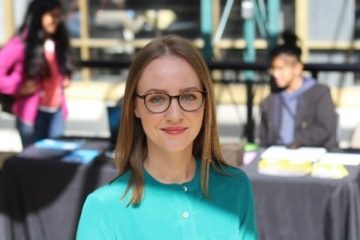
Scholarly Communications and Copyright Services Librarian, University of British Columbia
Bio:
Stephanie Savage is a Scholarly Communications and Copyright Services Librarian at UBC Library. In this role Stephanie educates the UBC community in matters of copyright law and policy and advises researchers on open access publishing and author rights. Stephanie is also the campus administrator for Open Journal Systems, an open publishing platform that hosts over 40 journals published out of UBC.
January 23, 2020: IRES Faculty Seminar with Lenore Newman
IRES Seminar Series
Time: 12:30pm to 1:30pm (every Thursday)
Location: AERL Theatre (room 120), 2202 Main Mall
*********************************************************************************
*** VIEW SEMINAR RECORDING (Audio begins at 4:18min)***
Farm in a Bottle: Implications of the Coming Future of Dairy
The global environmental impact of rising consumption of animal products presents serious environmental challenges. One alternative is cellular agriculture: the production of animal products in-vitro. Such “clean meat” technologies promise improvements in environmental metrics, animal welfare, and human health. This discussion highlights research into the potential impact of cellular agriculture on the dairy industry; though cellular dairy could offer significant ecological benefits, these could be countered by intensification of agricultural activity in equatorial regions for the production of feedstocks for cellular agriculture. Using the concept of telecoupling, an umbrella concept that refers to socioeconomic and environmental interactions over distances, this talk examines the policy landscape needed to prevent unequal distribution of the costs and benefits of alternatives to animal products.
Lenore Newman
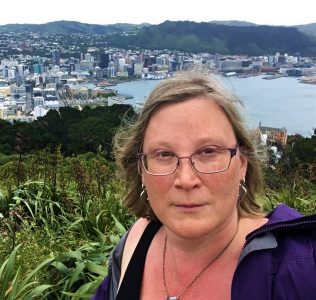
Bio:
Lenore Newman is the director of the Food and Agriculture Institute at the University of the Fraser Valley where she holds a Canada Research Chair in Food Security. Lenore is also a member of the Royal Society of Canada’s New College. Lenore researches agricultural land use policy, bioengineering in the food system, and the role of food and agriculture in the creation of place. Her first book, Speaking in Cod Tongues, was published to wide acclaim in January, 2017. Her second book, Lost Feast, was published by ECW Press in 2019. She holds a PhD in Environmental Studies from York University.
Website: http://lenorenewman.com/
Faculty Profile: https://www.ufv.ca/geography/faculty-and-staff/faculty-members/newman-lenore.htm

